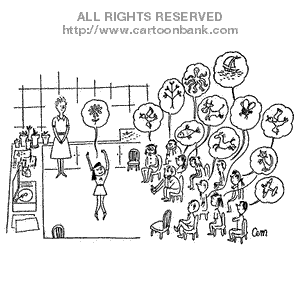In the last two weeks, i’ve attended two different gathering of minds that involved a distributed group of academics of all types, designers, pundits, technology creators, businesspeople, etc. I don’t have time for larger reviews on the discussions, but i wanted to record a few meta-notes for my own memory and for the readers’ entertainment.
Personal. I feel like the intellectual bastard child of loopy parents who never saw eye-to-eye. Maybe they got along before i was born, but i kind of doubt it. I can’t tell if my responsibility is to be the good kid who tries to help them make sense of each other or be the bad child who pits them against one another. In any case, i’m glad to have all of my parents in a room with one another, even when they’re not playing nice.
Backchanneling. I finally realized why selective backchanneling irks me. One thing that i bank on at conferences is that the attendees create a cohesive view of being annoyed with the conference. This happens because no one attends a conference for the content; they attend to talk to people. Thus, people love to find new ways to bitch about how the speakers are boring/irrelevant/valueless, the establishment is being disrespectful to the attendees (i.e. no power/WiFi), the planning is poor, things are running too long, there’s not enough food, etc. You name it, people always find a way to bitch at a gathering. And this serves a super valuable role at these meetings. It creates a point of shared context in which people can get to know one another well.
The thing about the IRC backchannel is that it’s *obvious* that there is a second-place to the conference. Thus, those not participating create another target of dislike in addition to the conference. One can despise the conference as well as the IRC channel. In most events, people don’t hate either the actual organizers of the conference or the participants of the IRC channel (since they’re friends anyhow); they simply despise the organization. With only a fraction of people participating, the IRC channel doesn’t become a communication tool; it becomes a second place. And since people are in both the IRC channel and the conference simultaneously, it means that you can’t just disregard that population – they are weaved too tightly. (You can disregard the conference attendees that just sit in the bar the whole time.)
When i bring this up to people, everyone loves to tell me that anyone could get on the channel so get over it. This *horrifies* me because it rings of “any person of color can get on the Internet so the race divide is their fault.” There are many reasons why people don’t feel comfortable on the IRC channel. It’s not their home domain; they don’t use laptops during conferences or they don’t have the skills to install the backchannel; they don’t execute well with continuous partial attention; speed typing is not comfortable…. You name it. It’s an environment that privileges those comfortable in it already. That said, i was quite impressed with the number of people that i saw engage for the first time at each event. Both non-participant groups said that they weren’t a fan of that behavior, but they were glad to be able to read it and contribute occasionally. Anyhow, i have to chew more on why this bugs me, but it still does. (In connection with Liz and Clay.)
Translation. I realize that there’s a lot of translation when you have diverse groups gather. That translation is not simply terminology, but culture and values. That said, it will never work when one group is required to defend themselves to the other, to prove their worth. I’ve learned that an event will be problematic if any group has to go on the defensive. Yet, at almost all events i’ve been to lately, there has been one marginalized group that felt that they had to prove themselves, that they had to stand up for their worth. This screws with everything.
This makes me realize how crucial the privilege conversation is. We all have situations where we are privileged, either because we’re in the majority or otherwise a part of the normative values. We usually talk about privilege in terms of race, class, gender, sexuality, etc. And we normally fail to ever convince anyone to make sense out of what it means to acknowledge privilege and try to put it down. I realize that this is a task that more people need to take up actively. We may not learn to give up privilege based on the qualities written on our bodies or otherwise part of our life-long identity, but maybe we can learn to give up privilege based on more localized, ephemeral situations. What does it mean to be in a room where there are two groups and you’re part of the dominant group? In this case, the number one responsibility of the dominant group is to do their darndest to open up and listen to the other group. Truly listen. Truly encourage. Not simply challenge to prove themselves, but figure out how to empower that group.
I can visualize what this means in a spiritual level. To use your power to blow air into the disempowered group, to lift them up through encouragement.
One of the weird things about two events that i attended is that i got to watch as the power between two groups swapped. And both group failed to relinquish their privilege to fully listen because they were too overjoyed to be in the dominant group. Lesson learned… even those of us who talk about privilege fail to check our own on a constant basis.
Anyhow, that’s enough meta mumbling for a bit.
